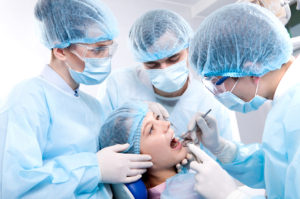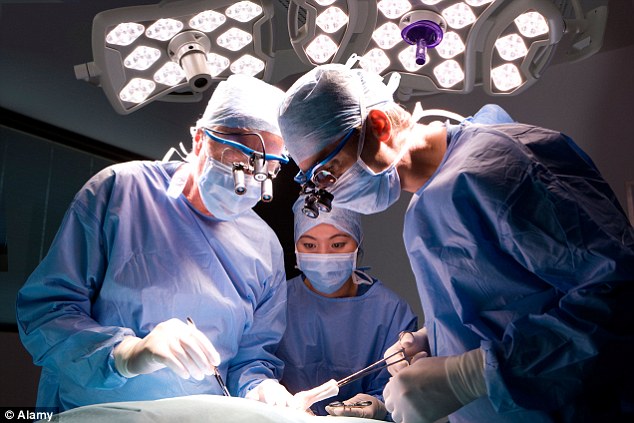Oral and Maxillofacial Surgeon: Education and Career Information
An Oral and Maxillofacial Surgeon is a specialist dealing with the diagnosis and surgical aspect of disease, injury and defects of the facial region. They are an orthopedic surgeon. This type of surgeon handles all aspects of this area, including dental work, such as impacted teeth, to more serious situations involving facial trauma. This role has a number of years of school to complete before becoming an oral and maxillofacial surgeon.
What does an oral and maxillofacial surgeon do?
An oral and maxillofacial surgeon performs surgery on the mouth and jaws. They can correct birth defects, perform facial reconstructions, and remove teeth. This is not the same as a dental surgeon, and this role is trained to do only a certain amount of surgery in the mouth. This type of surgeon has an additional four to six years of training and are highly trained in their areas. This type of surgeon will perform a more complex extraction, such as wisdom teeth. They also perform jaw surgery, dental implants and the removal of oral cancer, or benign tumors and cysts. These types of surgeons are unique in their specialty, as they have an additional four years in a hospital residency program for surgery after completing dental school. They are trained in emergency medicine, anesthesiology and general surgery. You will find oral and maxillofacial surgeons in large medical centers, hospitals and dental practices.
How much does an oral and maxillofacial surgeon earn?
The average salary for an oral and maxillofacial surgeon is about $218,960, according to the U.S. Bureau of Labor Statistics (2013), which can go as high as $240,400. This is dependent on education, experience, location and the type of practice. Private practice consultant surgeons usually make more on the higher pay range.
What types of skills are needed to become an oral surgeon?
There are a number of skills needed to be successful as an oral and maxillofacial surgeon:
Steady hands: This role has the oral surgeon on their feet for long periods of time. They must be able to have stamina and steady hands that remain calm in difficult situations.
Complex Problem Solving: As a surgeon, this role must be able to identify complex problems and work quickly to evaluate them to make effective decisions for the best solution.
Reading comprehension: This role should be able to read clearly for comprehension and apply the information learned to assist with decision making.
Critical thinking: This role must use logic and reasoning to identify areas of strength and weakness, considering alternative solutions and approaches to problems they encounter.
Speaking: This job requires speaking with a number of people at different times and on different levels. The oral and maxillofacial surgeon should be able to convey information to all these audiences in an effective way.
Active learning: The oral surgeon must understand any implications of their decisions as they integrate new information into their scope of work.
Monitoring: The surgeon must be able to monitor the patient as they are working to make sure there are no complications occurring.
Observational skills: Study and observation work hand-in-hand. The surgeon must have excellent observational skills in order to properly assess and diagnose patients, making adjustments as required.
Management of Personnel Resources: An oral and maxillofacial surgeon works with others to get the data they need. This role must be able to stand as a leader and effectively manage people and resources to ensure the safety of all patients.
Internship Requirements
Internship requirements vary based on school, state and program. Dental school requires a certain amount of internship hours prior to graduation. Once the student completes dental school, they will have to complete a hospital-based surgical residency program which is at minimum, four years.
Education Requirements
This is a highly specialized position, so the educational component is crucial. On average, an oral and maxillofacial surgeon has about 12 to 14 years of schooling prior to beginning their practice in the field. In order to pursue a career as an oral and maxillofacial surgeon, the student must enroll into a pre-dental program, or obtain a bachelor’s degree. Most students opt toward getting their bachelor’s degree, which is four years. A pre-dental program will contain coursework in science, biology, health, mathematics and chemistry.
Once the four year degree has been obtained, the student must attend dental school, which is an additional four years. This will help confer the degree of Doctor of Dental Surgery (DDS). In dental school, students will treat patients in a supervised setting to gain clinical and practical experience. Once dental school has been completed, a surgical residency program in a hospital is required. This will take another four to six years to complete. During this time, students usually pursue another advanced degree, or complete fellowships in a sub-specialty area.
After completion of the surgical residency, surgeons take a written and oral exam to become board certified in oral and maxillofacial surgery. Many oral and maxillofacial surgeons have both specialties – that of a dentist and a medical doctor. There are a number of programs that provide training in both concurrently, which also confers a medical degree in addition to the Doctor of Dental Surgery. This route is usually six years. Pursuing a Ph.D. may also be an option that is of interest.
This is a very challenging, yet interesting field to work in. Although they work long hours and may be under a lot of pressure at times, the work is varied enough to keep the surgeon learning at all times. If you are someone who enjoys learning new skills and procedures, and you have a vested interest in assisting people in restoring their ability to function normally in the facial region, this could be a great role. In addition, this is a very lucrative position that continuously grows based on experience. Going into this profession should be a serious consideration that takes a lot of thought, as the financial sacrifice in schooling is great.






